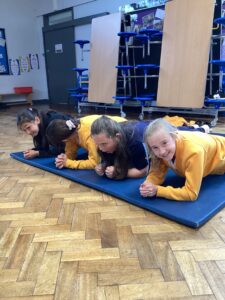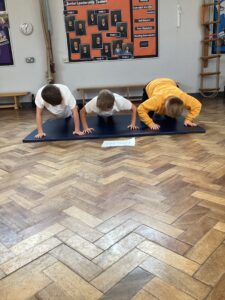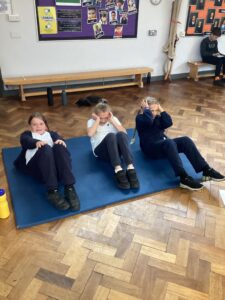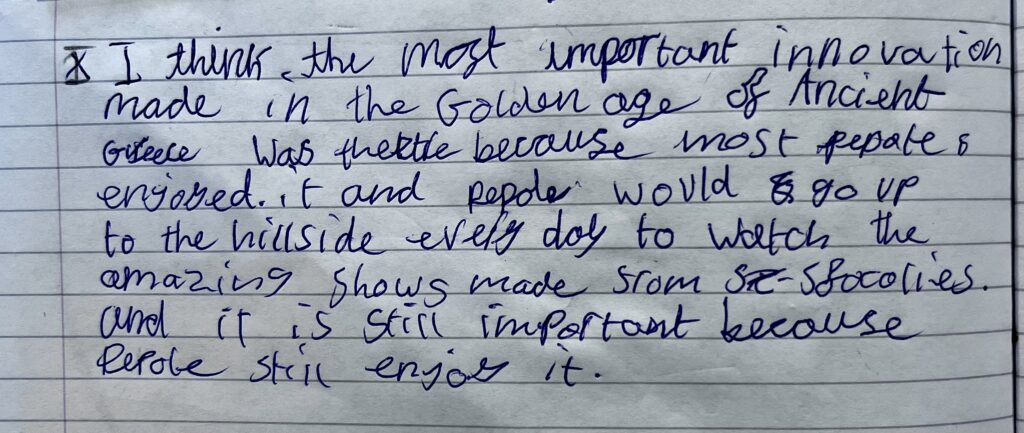Mindmate – Self-esteem
We had a visit from the Mindmate team this morning and we had a focus on developing our self-esteem and our positive thinking.

We spoke about negative thoughts and how we can turn these into a positive. We learnt about the ‘Power of Yet’. Ask your child what this means. Can they give examples?
We drew our ‘Brain Bully’ and what we can say to defeat it.




Social media can also cause negative self-esteem. The Mindmate team gave us some top tips when using social media.

PE – fitness
We simply love PE in Year 5 and 6. Every lesson is positive, and the children have enjoyed developing their hockey skills.
Due to the recent poor weather, we have taken our lessons inside and have focussed on building our fitness for hockey. We have completed circuits of press ups, sit ups, plank, shuttles, star jumps and the dreaded burpees!
We have again impressed Mr Kilner with our attitude and perseverance even when we have felt tired from our exercise.
Help at home – How do you keep fit and healthy at home? Ask your child what their favourite exercise was. Can they teach you it? Are there other ways to stay fit and healthy apart from exercise?








Awe and Wonder
We enjoy celebrating the natural world in Year 5 and 6. Yesterday morning, children couldn’t wait to tell me about the beautiful spider webs that were just outside our classroom door.
We also had a classroom visitor, which caused a mixed reaction.
Help at home – what makes you stand back in awe and wonder at home?



Lotherton Hall trip!
Years 3 and 4 had a fantastic time on our first trip of the year to Lotherton Hall! The aim of this trip was to support our ongoing science learning about animals, their habitats and their bone structures.
Mr Freeman and Mrs Poole were very impressed with the responses from the children during the workshops – children could confidently talk about the following:
- 5 animal groups (mammals, birds, reptiles, fish, amphibians)
- characteristics of animals within each group (classifying)
- vertebrates and invertebrates
- animals with skeletons and exoskeletons
Outside of the workshop, the children had chance to explore the wide range of animals at Lotherton. We found some very interesting bird types with unique characteristics and also noticed lots of animal names had originated from Latin roots!
Here are some great pictures from our trip – enjoy!













Philosophy Friday
Philosophy is thinking deeply.
Every Friday, we start our day with some time to wonder and ponder.
We’ve a different question each week – there’s no obvious right/wrong answer and no underlying moral message. All children are given the opportunity to contribute their ideas and give reasons for their thoughts.
This week’s question related to our school vision. Our vision is to be…
…a happy and healthy place to achieve and believe.
Read more about our school vision here.

This question sparked some interesting discussion and debate.
Healthy is more important because if you don’t stay healthy, you won’t feel very well. – Logan
I think healthy because you need to keep healthy so you can come to school and school makes you happy. – Poppy
If you weren’t happy, it could be a world of everyone being sad. – Izabella
I think healthy because you don’t always have to be happy. – Vincent
If you only eat healthy stuff, it might make you a bit angry and you wouldn’t be happy. – Woody
Our oracy focus this half term is:

Help at home by discussing this week’s Philosophy Friday question with your child. Why is our school vision important? What does ‘happy and healthy’ look and feel like at school, at home and in the community?
We’re Going on a Bear Hunt!
We’ve had a great week this week using our focus book We’re Going on a Bear Hunt by Michael Rosen and Helen Oxenbury.

We’ve made beds for the bear in the workshop area, cut bears out in the funky fingers area and written messages to the bear in the message centre. But the most exciting part of our week was definitely when we went on our very own bear hunt. We listened for lots of different noises on our sound walk: we heard, children talking, birds tweeting, leaves crunching and finally we found a bear!
Our word of the week has been squelch the children have really enjoyed using this during their learning.
“I am squelching in the mud!”
“Mrs Rippon made the paint squelch, it was a funny noise!”
Poetry Picnic
This week our poem was Falling Apples
Here is the tree with its leaves so green.
Here are the apples that hang between.
When the wind blows, the apples will fall.
And this is the basket to catch them all.
Phonics
This week, we have learnt the phonemes (the sounds a letter makes) g, o, c and k. We’ve also learnt a new tricky word; is.
During our phonics learning, we listened carefully to the initial sound in a word and sorted objects by the sounds they begin with.
Help at home: Look out for a ‘learn at home’ sheet which recaps the phonics learning from the week. Please look at this with your child and complete the activities.
Maths
This week, we have explored how numbers can be composed of 1s.
We have will learnt that a ‘whole’ is made up of smaller parts and is, therefore, bigger than its parts.
The classroom Challenges this week have been
- to write a message to the bear.
- to cut out the bears.
- to make a bed for the bear.
- to sort the materials wood, plastic and paper.
- to go on a bear hunt.
- to make a collection of up to 3 items and use the stem sentence 1 and 1 and 1 makes 3.
Next week our focus book is Henri’s Scissors by Jenette Winter.

Reminders and Notices
Stay and learn session
Our first stay and learn session will be on Wednesday 9th October 9am-10am. This is an opportunity for you to come into school to find out about phonics and watch your child learning in school. There will also be a coffee morning after the session.
Please ensure you sign up at the door before Tuesday 8th October or email stjameseyfs@spherefederation.org
Have a happy and healthy weekend and please don’t forget to email any pictures from home to stjames@spherefederation.org thank you as always for your support.
Mrs. Kendrew, Mrs. Rippon and Miss. Feldman and Mr. Smith.
What is happening outside?
Hello everyone!
This week we have been exploring the seasonal changes. We’ve been into forest school jumping in giant muddy puddles and collected some Autumnal objects to add to our tuff tray.
We have been focusing on fine motor control, using pincers to pick up our objects and practising using these skills with our fingers sorting them into baskets.
Fine motor skills involve small muscles working with the brain and nervous system to control movements in areas such as the hands, fingers, lips, tongue and eyes. Developing fine motor skills helps children do things like eating, writing, manipulating objects and getting dressed.

Help at home:
We practice ‘dough disco’ daily to further develop these skills. Here is one of the children’s favourites for you to enjoy at home!
(This is a YouTube link. Top tip for watching YouTube with your child: go to the settings cog along the play bar and turn off autoplay – this avoids an inappropriate clip coming up automatically, and helps to discourage your child from passively watching clip after clip.)
Have a happy and healthy weekend!
The Nursery team
Innovation in Ancient Greece
We are becoming quite the experts on Ancient Greece and have really enjoyed learning about the innovations made during the Golden Era of Ancient Greece. We conducted our own research and made posters to summarise our findings. We also reflected on what the most important innovation was.









Help at home
Challenge your child to teach you what they have learned about innovation in the Golden Era of Ancient Greece. They could use this website to help them: https://www.bbc.co.uk/bitesize/articles/ztxc4xs#:~:text=The%20Greeks%20pretty%20much%20invented,and%20even%2C%20the%20vending%20machine!
Times Tables Rock Stars Wall of Fame
We really enjoyed dressing up for our Times Tables Rock Star photos to create pictures for our Wall of Fame! Congratulations to all the children who are on our Times Tables Wall of Fame this week. To be on the Wall of Fame, you need to have played 15 minutes of Times Tables Rock Stars games over the week. The Wall of Fame is updated every Friday so I can’t wait to see which superstars we will be celebrating next week!
Rumour has it our classroom will be open for TTRS Club on a Tuesday lunchtime for anyone who wants some extra time to play. See you there!




Maths: Wholes and Parts
In maths we are learning about wholes and parts. The children have started by learning how wholes are made up of parts.
_______ is a part. _______ is a part. The whole is _______.
Using counters the children were able to identify that two parts make a whole.



With practise, the class will start to represent parts and wholes using part whole models.
Help at home
Ask your children simple questions about parts and wholes:
If 3 is a part and 2 is a part, what is my whole?